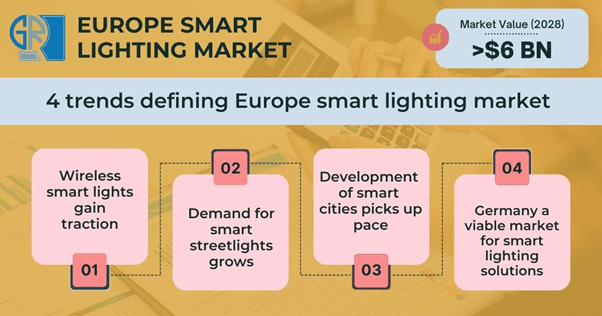Europe smart lighting industry value will increase over the coming years as there is a robust demand for lighting solutions that prevent excessive electricity consumption. While smart light bulbs are costlier than the regular LED or compact fluorescent ones, their energy saving capacity can compensate for the heavy initial investment.
Smart lights can also improve home security. Advanced features in these products, such as motion detection can send alerts to homeowners upon identifying unusual movement. They also offer a wide range of customizations, helping clients set the ambience at home or workplace.
Rising carbon emission level from electricity consumption is becoming a serious cause of concern for customers in Europe. According to Eurostat, the total net electricity production in the EU reached 2,664 TWh in 2020. Growing inclination toward smart home devices adoption will fuel the deployment of innovative light technologies. Reportedly, Europe smart lighting market size is anticipated to be over USD 6 billion by 2028.

- Wireless smart lights gain traction:
Wireless technologies are being integrated into smart lights to increase their efficiency. Bluetooth and Wi-Fi are some of the commonly used modalities in smart lighting systems.
The commercial sector is opting for Bluetooth-powered lighting solutions as the components deliver large-scale lighting control. They enhance the occupant experience and save energy as well. Various manufacturers are launching improved versions of wireless lighting devices.
For instance, in August 2020, Wiz Connected entered the Europe market with an all-new range of smart lights, which included the launch of LED filament bulbs. These bulbs are equipped with Bluetooth and Wi-Fi dual-protocol chip and claim to be reliable and easy to install.
2. Demand for smart streetlights grows:
Outdoor lighting systems play a vital part in improving road safety. However, they consume a lot of energy during operation. To give an example, streetlights in Spain consume around 5,296 GWh of electricity per year, costing the authorities nearly USD 789 million each year.
This has urged governments across Europe to introduce policies and initiatives that encourage commercial and industrial end-users to switch to smart lighting systems.
Regional government investments have also positively impacted the adoption of smart outdoor lighting solutions. For instance, Europe’s Sharing Cities program hit the USD 302.8 million investment milestone in smart technologies.
3. Development of smart cities picks up pace:
Europe is becoming one of the leading regions in terms of the development of smart cities. The regional governments are realizing the potential dangers of continuing their usage of fossil-fueled energy sources to generate electricity.
They are actively promoting the benefits of opting for smart lighting and metering solutions among end-users to reduce their dependence on energy-intensive lighting systems. Many programs have been launched to expand the network of smart cities, boosting product adoption.
For example, in October 2020, the ‘Smart Cities Marketplace’ was launched to create eco-friendly, resilient, and smarter urban areas. The initiative will also help the region achieve its carbon neutrality goals.
4. Germany a viable market for smart lighting solutions:
Germany is one of the leading nations in Europe in terms of innovation and technology. The country has a notable presence of reputed smart lighting manufacturers. They are taking some vital steps to enhance the production of smart lighting systems. For instance, in March 2022, Sycra Technologies Limited announced that it had scaled up its operations in Hong Kong to keep up with the robust local and international demand for smart lights.
Europe smart lighting industry will experience strong growth in the future as the region is taking significant measures to lower its carbon emissions. It has also set ambitious energy efficiency and carbon neutrality targets, which will further propel the demand for advanced lighting devices. Cooper Industries (Eaton), Bridgelux, Spring Networks, Tvilight, Hubbell, Acuity Brands, Honeywell, Digital Lumens, and Philips Lighting, among others, are the top providers of smart lighting solutions in Europe.


